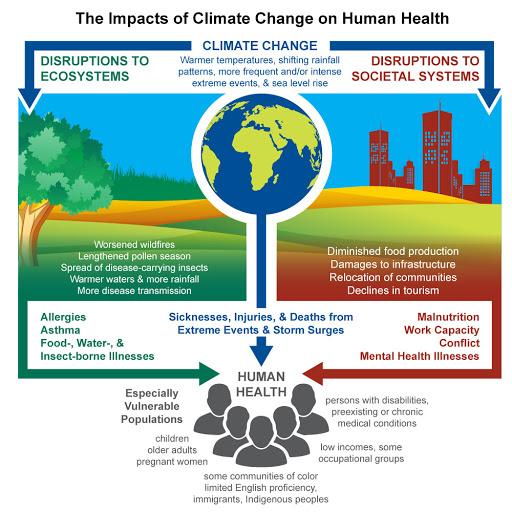Impact of Climate Change on Human Health

Although global warming may bring some localized benefits, such as fewer winter deaths in temperate climates and increased food production in certain areas, the overall health effects of a changing climate are overwhelmingly negative. Climate change affects many of the the social and environmental determinants of health – clean air, safe drinking water, sufficient food and secure shelter.
Climate change will bring new and emerging health issues, including heatwaves and other extreme events:
Extreme high air temperatures contribute directly to deaths from cardiovascular and respiratory disease, particularly among elderly people. In the heat wave of summer 2003 in Europe for example, more than 70 000 excess deaths were recorded. High temperatures also raise the levels of ozone and other pollutants in the air that exacerbate cardiovascular and respiratory disease. Pollen and other aeroallergen levels are also higher in extreme heat. These can trigger asthma, which affects around 300 million people. Ongoing temperature increases are expected to aggravate this burden.
Many infectious diseases, including water-borne ones, are highly sensitive to climate conditions:
Climatic conditions strongly affect water-borne diseases and diseases transmitted through insects, snails or other cold-blooded animals. Changes in climate are likely to lengthen the transmission seasons of important vector-borne diseases and to alter their geographic range. For example, climate change is projected to widen significantly the area of China where the snail-borne disease schistosomiasis occurs.
Malaria is strongly influenced by climate. Transmitted by Anopheles mosquitoes, malaria kills over 400 000 people every year – mainly children under 5 years old in certain African countries. The Aedes mosquito vector of dengue is also highly sensitive to climate conditions, and studies suggest that climate change is likely to continue to increase exposure to dengue.
Who is at risk?
All populations will be affected by climate change, but some are more vulnerable than others. People living in small island developing states and other coastal regions, megacities, and mountainous and polar regions are particularly vulnerable. Children – in particular, children living in poor countries – are among the most vulnerable to the resulting health risks and will be exposed longer to the health consequences. The health effects are also expected to be more severe for elderly people and people with infirmities or pre-existing medical conditions. Areas with weak health infrastructure – mostly in developing countries – will be the least able to cope without assistance to prepare and respond.
WHO response
In 2015, the WHO Executive Board endorsed a new work plan on climate change and health. This includes:
- Partnerships: to coordinate with partner agencies within the UN system, and ensure that health is properly represented in the climate change agenda.
- Awareness raising: to provide and disseminate information on the threats that climate change presents to human health, and opportunities to promote health while cutting carbon emissions.
- Science and evidence: to coordinate reviews of the scientific evidence on the links between climate change and health, and develop a global research agenda.
- Support for implementation of the public health response to climate change: to assist countries in building capacity to reduce health vulnerability to climate change, and promote health while reducing carbon emissions.